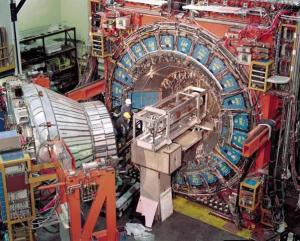The Collider Detector at Fermilab experiment

CDF stands for the Collider Detector at
Fermilab. CDF is an experiment at Fermilab, which is currently home to
the second world's most powerful particle accelerator called the
Tevatron. The CDF is an international collaboration of about 500
Physicists (from universities and national laboratories from
Canada, Italy, Japan, UK, US, Germany, Spain, Russia, Finland, France,
Taiwan, Korea, Switzerland, etc.).
The IFCA group has play an important role in the data taken from 2002
up to now. During the upgrade of the CDF detector, by building and
commissioning of a particle identification detector, the Time-of-Flight
(TOF), that has proven to be instrumental for the observation of
oscillations of the strange B meson into its antiparticle. REFTOF
From the physics side the group has particpated in several analysis
in this last decade. We have been very involved in the observation of Bs
- Bs oscillations from a time-dependent measurement of the Bs
oscillation frequency Δms. [REFBS]. From the high momentum physics, we
started measuring the top cross section in the lepton plus jet channel
[REFTOP]. From this analysis we move to the search for the single top
process.The production of single top quarks, which involves the weak
nuclear force and is harder to identify experimentally, has now been
observed, almost 14 years to the day of the top quark discovery in 1995
RREFSGTOP. At the same time we were involved in the single top search,
we started the search for the higgs boson, produce in association with W
and decay into bbbar, which is the same final state as the single top
analysis.
The advance analysis techniques pioneered for the single top
discovery are now in use for the Higgs boson search. For the first time
in an hadronic collision data new constraints on the elusive Higgs
particle are more stringent than ever before xperiments now exclude a
Higgs particle with a mass between 158 and 175 GeV/c2. Searches by
previous experiments and constraints due to the Standard Model of
Particles and Forces indicate that the Higgs particle should have a mass
between 114 and 185 GeV/c2. The new Fermilab result rules out about a
quarter of the expected Higgs mass range. REFHIGG
- A Time-Of-Flight Detector in CDF-II, Nucl. Instrum. Meth. A518:605-608, 2004
- Observation of Bs-Bsbar Oscillations, Phys.Rev.Lett.97:242003,2006
- Measurement of the tt-bar Production Cross Section in p
anti-p Collisions at s**(1/2) = 1.96 TeV using Lepton + Jets Events with
Jet Probability b-tagging, Phys. Rev. D74, 072006 (2006).
- Measurement of the tt-bar Production Cross Section in p anti-p Collisions at s**(1/2) = 1.96 TeV, Phys. Rev. Lett. 97, 082004 (2006).
- Observation of single top quark production with CDF, Phys. Rev. D 82, 112005 (2010).
- Search for a Standard Model Higgs Boson in WH --> l nu bb-bar in p anti-p Collisions at s**(1/2) =1.96 TeV, Phys. Rev. Lett. 103, 101802 (2009)
- Combined CDF and D0 Upper Limits on Standard-Model Higgs-Boson Production. arXiv:1007.4587 [hep-ex].
